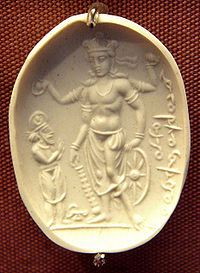- Mihirakula
-
Sardonyx seal representing Vishnu with a worshipper, Afghanistan or Pakistan, 4th-6th century CE. The inscription in cursive Bactrian reads: "Mihira, Vishnu and Shiva". British Museum.

Mihirakula (Chinese: 大族王, Japanese: Daizoku-o) was the most important Sveta Huna ruler in India. He was the son of Toramana, the founder of Huna power in India. He ruled his horde from 502 to 530 [1].
Mihirakula is described in "The Record of the Western Regions" by Hsüan-tsang (7th century) as a good ruler who started to conquer neighbouring territories. His Gwalior inscription issued in the 15th regnal year shows that his sovereignty extended at least up to Gwalior. Mihirakula suffered a defeat by the Aulikara king Yasodharman of Malwa[2] in 528, and the Gupta emperor Narasimhagupta Baladitya. By 533 Mihirakula had been driven off the plains of northern India, taking refuge in Kashmir, with his capital at Sialkot, and he is thought to have died of disease in 533[3].
Mihirakula is remembered in contemporary Indian and Chinese histories for his cruelty and his destruction of temples and monasteries, with particular hostility towards Buddhism.[citation needed] He claimed to be a worshipper of Shiva[citation needed].
See also
- Huna people
- Toramana
Notes
- ^ Rene Grousset(1970). The empire of the steppes - a history of central Asia, Rutgers, ISBN 0-8135-0627-1, p.71
- ^ Ojha, N.K. (2001). The Aulikaras of Central India: History and Inscriptions, Chandigarh: Arun Publishing House, ISBN 81-85212-78-3, p.52
- ^ Si-yu-ki, tr. by S.Beal, pp. 168-172.
External links
Categories:- Ancient India
- People in the history of Pakistan
- Converts to Hinduism
- History of Kashmir
- Hephthalites
Wikimedia Foundation. 2010.

